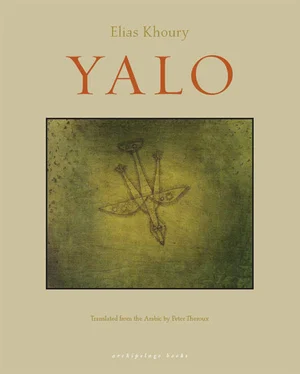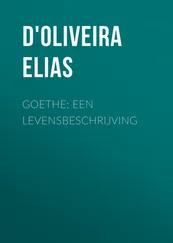Elias al-Shami was different. When Gaby went back to him, he felt that he was awakening. He said that he didn’t want to lie to her, that he did not want to be like all the other men who lied. He said that when she got married, she fell off the edge of his life. He said that he’d forgotten her and was relieved. “Why are you coming back? I was calm. It was over.”
What could she say? At six o’clock in the evening, she felt a gale stirring inside her, and this gale commanded her to go to the tailor shop. She knew that the master would be by himself now. He opened the door and rubbed his eyes as if he didn’t believe them.
“Come in, come in,” he said hesitantly.
She entered and stood in the portico where she had always stood at six o’clock nude beneath his gaze, and he would take her in his arms. She stood there, hesitant, stammering.
“You’re still beautiful, Gaby,” he said. He lit a cigarette and sat in the rocking chair without inviting her to have a seat. So she remained standing, arms folded. He told her how he’d forgotten her to return to his normal life and reconnect with his clients. He went back to his innocent sexual banter with the women workers in the shop, which never left him troubled, and he never had to undress. He burst out laughing: “Do you know, Gaby, you’re the one who taught me how to strip? Maybe I taught you everything, but you taught me how to take off my clothes. I don’t like taking off my clothes, I feel self-conscious. Even with my wife, I never —”
“I don’t want to hear about your wife,” she said.
Gaby didn’t know where this old talk came from. When they had been in love, she had never allowed him to speak of his wife or his three children. And now, even though she had come here for work, and she didn’t want to rekindle their relationship or be maddened by jealousy again, she reverted involuntarily to her old way of speaking.
When Gaby agreed to marry, it was as if she were throwing herself into an abyss. She saw the man coming to the house and heard her father giving his consent. She closed her eyes, said yes, and fell from a great height. She said yes and went to the shop the next morning. She went to Master Elias’s room, where he was drawing with green chalk on a piece of fabric, and she said, with no preliminaries, that she was engaged and was going to get married. The man raised his head from the piece of fabric and looked at her from beneath his glasses. “Congratulations,” he said. “I can’t say anything but congratulations, my darling. It’s your right, I have no right over you. I pray that you’ll be happy.”
She left his room and went back to her sewing machine, immersing herself in her work. That evening, she did not linger, as had been her habit; instead, she was one of the first to leave the shop. When she was at the door, she heard his voice calling to her to stay a little longer because one of the dresses needed altering. She said, “Sorry, but I’m in a hurry. Tomorrow.”
She did not return to work. She told her father that she had lost the desire to work, and the cohno said that it was for the better. It never occurred to him that his daughter, who had closed her eyes as she agreed to marry George Jal’u, was throwing herself into an abyss of despair after having given up on her true love.
She said that she had not come here for the sake of the past; now she was a married woman and had come for work; she asked him whether she might get her old job back.
“Everything will be like before,” he said. “You can start tomorrow morning.” Then he came near her and reached his hand out as he had done before, but she didn’t offer him hers or come near him.
“Thanks, boss,” she said, and left.
But this thanks, boss evaporated quickly, and Gaby slipped back into their old story. And there he was again insisting: “What is the most important thing in life?”
Gaby couldn’t understand how this man never bored himself with his own talk. She was with him now because she needed a job and because she dreaded the heaviness of the night. She wanted him just one night, for which they would go to a hotel or anyplace he wanted. He promised her that they would go to the Grand Hotel in Sofar, and he set a rendezvous with her there, but at the last minute — after she had invented a plausible lie for her father — he said that he couldn’t make it and had to postpone. Whenever she got upset, he would shrink with sorrow and anger, and in the end she would console him, as if she had committed some sin that needed his forgiveness.
“You still haven’t told me what the most important thing in life is.”
She knew that he was waiting for the same answer about the navel and the art of tailoring. But the last time, he surprised her with the dog. He said that dogs were the most important thing. And he went back to the Gospel of Barnabas to recite how God had created the dog.
“Listen,” he said.
She stood half naked, yawning, certain that she would hear the story of Adam, the spittle, and all the rest.
He opened the book and recited:
“‘One day Satan approached the gates of Paradise, and when he saw the horses eating grass, he told them that if this mass of earth received a soul, they would suffer from it; therefore it was in their interest to trample on that mass of earth so that it would be ruined. So the horses, stirred up, violently commenced to assail that bit of earth among the lilies and roses.
“‘And so God thenceforth gave a soul to that unclean part of the earth upon which fell the spittle of Satan, which Gabriel took from the mass. And dogs were created, barking, and the horses were frightened and fled. Then God gave a soul to humankind and all the angels sang: Our Lord, may His holy name be blessed.’
“Did you understand?” he asked.
“God bless you, please, that’s enough. I want to go home, I’m tired.”
“You understood that God created dogs to defend humankind? That is true, but it’s not the most important thing — ask me what the most important thing is.”
“Whatever. What is the most important thing?”
“The most important thing, my love, is that man and dog come from the same clay, and when sin takes hold of man, he becomes a dog.”
“So we’re dogs?” she said.
“Not at all. Love is not a sin,” he said.
When he spoke to her of dogs, she realized that everything had become bland and monotonous, and that she no longer loved him. Gaby told Catherine that she no longer loved him: “But I stayed with him, and that’s the worst thing. When you don’t love someone but you stay with him, even if he’s not your husband. I mean, I understand, a married woman or a married man, she’s the one who’s judged, and the judgments always favor the man. But me, what do I care? I don’t know what came over me.”
“So how did you leave him?” asked Catherine.
“I didn’t leave him. I stayed with him to the end, even after my father went after him. I don’t know, things eventually just died a natural death.”
Gaby told of what happened between her father and Elias al-Shami, and how she felt, as she listened through a partly closed door to the conversation between the two men, that her father had devoured the man.
“Devoured, yes. That was the first time in my life I saw how a human being can become a predator. It was as if my father was chewing him up, and the other shrunk more and more. He devoured him with words. I don’t know how to describe it to you. Finally, it stopped. I was happy. I pretended to be upset, because I should have been upset, but deep down, my anger was sweeter than joy.”
Gaby said that she had been happy to see her father devouring Elias with words. He did it as if he were spreading out a tablecloth before gobbling up a feast. The cohno ground up the words as if he were grinding up the man himself, and the man shrank and nearly disappeared.
Читать дальше












